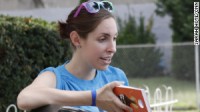Philadelphia (CNN) — Beth Rutstein rolls up the sleeves of her T-shirt, juggles a stack of fliers and knocks on the door of a stranger’s home. She’s on a mission to save lives.
After wiping sweat from her face beneath the sweltering afternoon sun on a recent Thursday, she ascends another set of stairs leading to a front door and knocks.
No one answers, but she’s greeted warmly by neighbors sitting in the shade of the covered connecting porch.
“We’re here doing free HIV testing,” she tells them, handing over a flier. “We decided to come here because 19143 has one of the highest rates of HIV in the entire city.”
That’s the ZIP code for southwest Philadelphia, one of many urban neighborhoods across the United States that account for the bulk of the nation’s HIV cases.
Rutstein, a second-year medical student, is one of 60 outreach volunteers who spent their summer going door-to-door alongside health care workers testing residents within the 19143 ZIP code.
This part of Philadelphia — like many other urban neighborhoods in the United States — has an HIV infection rate on par with many sub-Saharan African nations, including Sierra Leone and Ghana, according to UNAIDS.
In fact, more Americans are living with HIV infections today than ever before partly because of an increase in testing and treatment options, according to the Centers for Disease Control. About 1.2 million Americans are HIV positive, with a rate of 50,000 new cases each year, according to the CDC. Yet, 20% of those infected are unaware they are HIV positive.
AIDS survivor: Epidemic isn’t over yet
In Philadelphia, more than 19,000 residents have HIV, with the highest rates among black residents living in low-income neighborhoods with limited access to health care facilities and services.
“About 40 to 50 neighborhoods account for about half of the United States’ infections,” said Amy Nunn, founder of Philadelphia’s Do One Thing, Change Everything Campaign. “In Philadelphia, a few neighborhoods have very high rates of infection, and those few neighborhoods are driving the overwhelming share of infections.”
To change that, Nunn and her team enlisted volunteers to go to those neighborhoods, knock on doors, get people tested and, if HIV positive, get them free treatment.
While many volunteers get a “no thank you,” they have tested more than 160 people since the program started in July. So far, no one has tested positive for HIV.
CLICK HERE to read the full story

